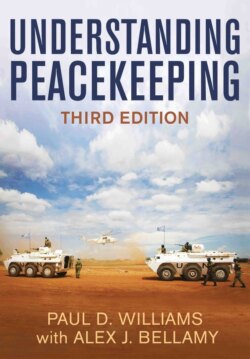Читать книгу Understanding Peacekeeping - Alex J. Bellamy - Страница 22
Box 1.1 Advocates of liberal peace
ОглавлениеThere is an obvious connection between democratic practices – such as the rule of law and transparency in decision-making – and the achievement of true peace and security in any new and stable political order. These elements of good governance need to be promoted at all levels of international and national political communities. (Boutros-Ghali 1992: §59)
Democracies don’t attack each other … ultimately the best strategy to insure our security and to build a durable peace is to support the advance of democracy elsewhere. (US President Bill Clinton, ‘State of the Union Address’, New York Times, 26 January 1994)
The right to choose how they are ruled, and who rules them, must be the birthright of all people, and its universal achievement must be a central objective of an Organization [the UN] devoted to the cause of larger freedom … The United Nations does more than any other single organization to promote and strengthen democratic institutions and practices around the world. (Annan 2005a: §§148 and 151)
I believe that as imperfect as they are, the principles of open markets and accountable governance, of democracy and human rights and international law that we have forged remain the firmest foundation for human progress in this century. (US President Barack Obama, speech to the United Nations General Assembly, 20 September 2016)
Although liberal peace has been the dominant theory underpinning many contemporary peace operations, its application remains controversial for several reasons. First, many powerful actors around the world, including rising powers such as China, retain distinctly illiberal political preferences. Second, liberal reforms have often been rejected by powerful local constituencies on the receiving end of such peace operations. And, third, partly because many of the world’s peacekeepers come from countries without a domestic tradition of liberalism. The assumptions behind the liberal peace have also been challenged by scholars. Some deny the basic empirical assertion at the heart of liberal peace theory by pointing to wars between or within democracies or arguing that the dataset remains too small to draw statistically relevant conclusions (e.g. Mearsheimer 1994). Others warn that, while the goal is laudable, the rapid liberalization of post-war societies has destabilizing effects that undermine the chances of achieving stable peace (e.g. Paris 2004). Still others suggest the values underpinning liberal peace are not universal or causally connected to peace but reflect the ideological preferences of the world’s most powerful actors (e.g. Barkawi and Laffey 1999). Because of this, some realists argue that powerful states should not allow themselves to become entangled in the domestic affairs of others, except on the rare occasions where vital national interests are at stake (e.g. Mearsheimer 2018; Walt 2019). In response, defenders of liberal peacebuilding have criticized the critiques as faulty and made the prudential case that ‘there is no realistic alternative to some form of liberal peacebuilding strategy’ (Paris 2010: 340). It is important to recall that liberal ideals such as legitimate functioning states, democracy, economic growth, gender equality and the rule of law are correlated empirically with greater peacefulness overall (e.g. Acemoglu and Robinson 2013; Gat 2017; Hudson et al. 2014).
